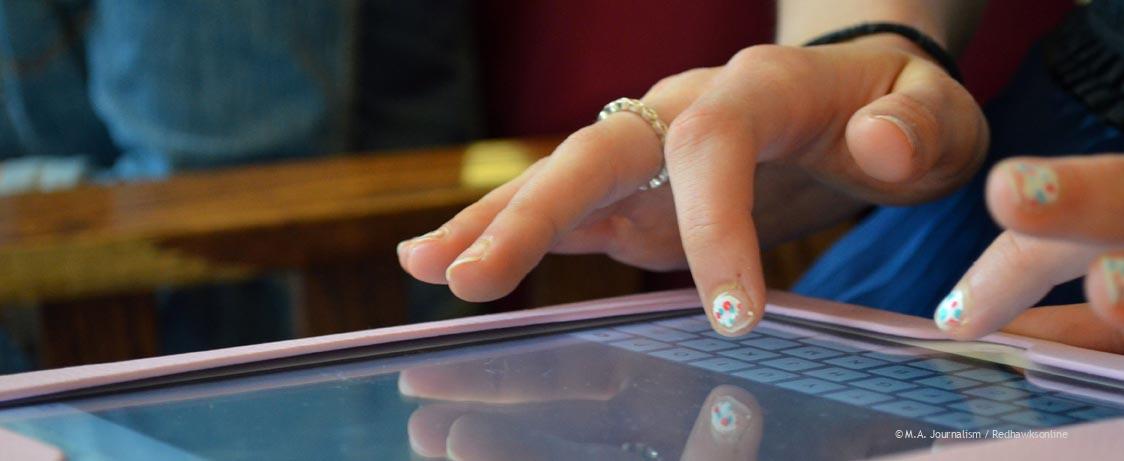After pilot program devices are welcomed; students, staff and faculty change skeptical opinions
It was nearing the end of the school year. The air finally smelled of summer after a painfully long winter and students sat in shorts, t-shirts, and sandals in the chapel. Principal Nancy Johnson walked up to the podium and welcomed everyone to assembly. A projection screen descended out of the ceiling and a colored Powerpoint appeared with four large letters: B.O.L.D. B.O.L.D. or the Bring your Own Learning Device program was described to everyone after what the administration deemed as successful test runs in such classes as AP United States History and Physics last year. This school year students and teachers alike, have dived into this new program.
“There’s no one perfect program out there and so you really have to find the best fit for your school,”said one main point person for B.O.L.D. and Physics teacher Sam Meyers. “We thought about this for well over a year of hashing this out with the administration and other students and getting feedback and we really felt that B.O.L.D. was really the way to for our school.”
Skepticism rose to meet the program. Among the skeptics was senior Annie Bonello. “I initially didn’t think it was going to be a good idea,” said Bonello. “I used to think there would be a lot of students that would misuse the devices and not focus in class.”
However, since B.O.L.D has officially been integrated into the school system, Bonello has been surprised by the opposite reaction her classmates have been giving.
“The student body as a whole has been really respectful with this privilege that we have been given,” she said. United States and AP World History teacher Elizabeth Van Pilsum had similar skepticisms regarding B.O.L.D. to Bonello’s. However, since the official inception of the program, Van Pilsum has also found that students have been respectful of the guidelines set. She hopes to continue to integrate more tools for her classes.
“This Notability tool,” she said. “I’m extremely interested getting acquainted with it and finding it a use in my classroom.”
However, some still prefer paper and pencil over a keyboard, and books over the internet.
“I prefer to have a textbook in front of me or something more hands-on,” said junior Gunnar Nelson. “For me personally, a hard copy of something just makes it easier to read.”
Too much screen time was one of the major concerns posed by a large number of students, parents and faculty alike. Outside of classes, a rule has been enacted to limit student exposure to screen time that prohibits the use of devices for anything non-school related.
“We want the free time at school to still foster social interaction,” said Meyers. “The students have to keep that. Learning new technology is great but it can’t be at the cost of losing that social interaction because that’s still just as important as any of these tech tools are.”
And inside the classroom, teachers have been limiting constant use of devices.
“Our goal is to not have every student on a screen all day long,” said Meyers. “This is why we [administration] told teachers that they do not have to integrate this everyday. Not every class is going to need to use the devices all of the time.”
Here Meyers brings up another concern posed for the B.O.L.D. program; there would not be enough use in the classroom to justify buying a device, thus rendering the B.O.L.D. program a waste of money.
“When we took surveys of the students and asked them about the devices they already owned, a good majority of our students already owned some sort of personal electronic device,” said Meyers. “So because of that we didn’t feel we were making it a huge financial disadvantage for a large portion of our students because so many of them already had devices.”
This also highlights the fact of why the B.O.L.D. program welcomed the use of all electronic devices, not just iPads. Meyers explained that the reason for this was to limit the financial strain on families because they didn’t need to specifically buy an iPad. Not only did this policy of not requiring an iPad eliminate additional unneeded cost, but it also, according to Meyers, provided the student body the opportunity to bring the devices they were most accustomed to working with. In all integrating processes, whether it be technology or some other new idea, there are going to be costs, monetary and otherwise, and there are going to be benefits. No policy is ever perfect, they all have their little kinks that need to be worked out and some problems that can never be resolved. But the important question is whether the benefits are big enough to justify the costs.
“We’ve already thought about potential problems before hand and it’s not perfect but we were careful about our implementation and timing to avoid a lot of the mistakes that many schools have made with this implementation,” said Meyers. Principal Nancy Johnson, as well as Meyers, ensure that the technological advances that the B.O.L.D. program presents will not act as a substitute for personal teaching and learning in the classroom.
The idea of B.O.L.D. has always been to enrich the classroom experience and open doors to students in the world of technology.
“It’s not that the technology will replace the teacher,” continued Meyers. “It will enrich the classroom because not only will the learning be happening one way but it will increase the potential for more learning to occur from all directions now.”
School is a place where students are supposed to learn. Learn about the world, learn about how to live in it. With the world advancing in technology, school must advance with it. With the B.O.L.D. program, both students and teachers are learning how to deal with the ever-changing spectrum of technology while still holding onto the skills that are essential with becoming active participants in the world.

